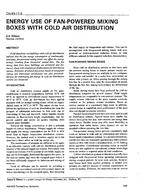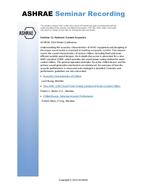District heating in the United States is currently undergoing a critical evaluation by government planners responsible for promoting energy self-reliance. Efficient use of energy and the possibility of utilizing domestic energy sources in place of foreign fuel are two of the potential benefits gained by the installation of a district heating system. As an added incentive, in many cases the unit cost of the district heat to the consumer will be low enough to promise dollar savings now, with the promise of even greater savings in the future if the cost of foreign oil and other fossil fuels continues to rise.
The economic feasibility of a district heating system is determined by a complex interrelationship of several major factors, including: (1) heat source quality and availability, (2) heat.load density, size of the market, and building characteristics, (3) distance of the heat source from the load, (4) pipe technology, (5) existing land use, (6) financial and institutional considerations applicable to the project, and (7) fuel prices. The bottom line in any analysis of the economic feasibility of a district heating system is the cost to the utility to provide a unit of heat to the consumer. This cost of delivered heat, in a broad sense, is determined by those factors which affect the magnitude of the capital investment, the required rate of return, and the pattern of capital expenditure over time. Finally, to obtain the final cost to the consumer, retrofit costs must be estimated. This paper describes a methodology developed by a national Laboratory to assess the economic feasibility of district heating for any community in the United States.
Citation: Symposium, ASHRAE Transactions, Volume 88, Part 1, Houston, TX
Product Details
- Published:
- 1982
- Number of Pages:
- 11
- File Size:
- 1 file , 980 KB
- Product Code(s):
- D-HO-82-15-1


